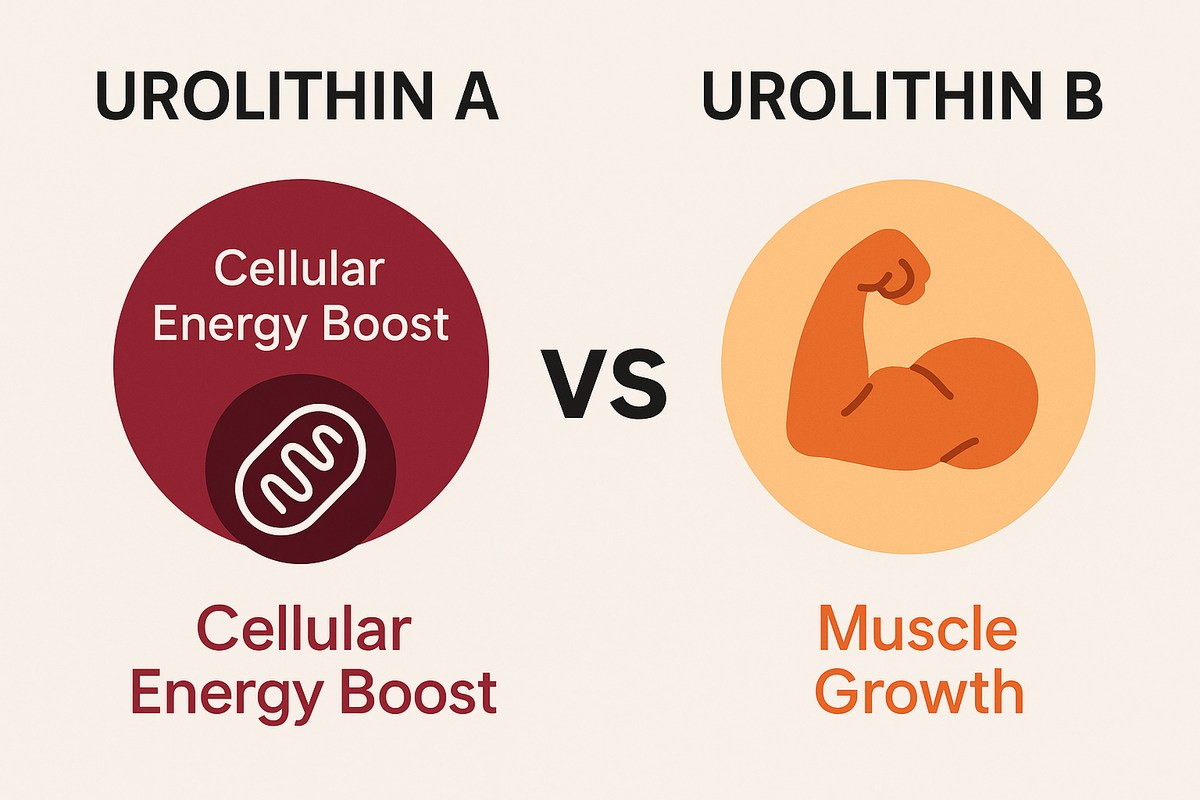
Urolithin A vs B: Key Differences and Health Benefits Explained
|
|
Time to read 2 min
|
|
Time to read 2 min
When it comes to unlocking the power of polyphenols found in foods like pomegranates, walnuts, and raspberries, two compounds stand out: Urolithin A and Urolithin B. Both are metabolites produced by your gut microbiome when you eat ellagitannin-rich foods—but they don’t act the same in your body.
So, what’s the real difference between Urolithin A vs B, and which one should you pay attention to for health and longevity? Let’s break it down.
Urolithins are bioactive compounds your gut bacteria create when they break down ellagitannins, a type of polyphenol. These metabolites are where many of the antioxidant, anti-inflammatory, and cell-protective benefits of foods like pomegranates actually come from.
But not everyone produces them equally. Your gut microbiome plays a major role in how much Urolithin A and Urolithin B you make—some people may barely produce them at all. This is where supplementation can help.
Feature
Urolithin A (UA)
Urolithin B (UB)
| Main Role | Mitochondrial health, cellular cleanup (mitophagy) | Muscle protein synthesis, possible anabolic boost |
| Research Focus | Longevity, energy, anti-aging, neuroprotection | Muscle growth, bone health, inflammation |
| Bioavailability | Higher plasma levels, more widely studied | Lower levels in humans, less research |
| Mechanism | Clears damaged mitochondria, boosts energy production | Stimulates mTOR pathway for muscle building |
| Supplement Availability | Widely available (e.g., Timeline Nutrition’s Mitopure) | Rarely available as standalone supplement |
Supports Mitochondrial Function: Activates mitophagy, removing damaged mitochondria to enhance energy production.
Promotes Longevity: Linked to improved muscle endurance and healthy aging.
Reduces Inflammation: Helps protect against chronic, low-grade inflammation.
Potential Brain Health Support: Preclinical studies suggest neuroprotective effects.
Muscle Growth: Stimulates protein synthesis through the mTOR pathway, potentially aiding muscle recovery and strength.
Bone Support: Early research suggests benefits for bone density.
Anti-Inflammatory Effects: Similar to UA, though less well-studied.
Not everyone produces enough Urolithin A naturally, even with a diet rich in pomegranates or walnuts. Your gut microbiome plays a huge role, and for many people, conversion is limited or nonexistent. That’s where a clinically tested supplement like Timeline Nutrition’s Mitopure® can make a difference.
Mitopure is the first and only Urolithin A supplement backed by human clinical trials, shown to:
Improve mitochondrial efficiency and energy production.
Support muscle strength and endurance as you age.
Activate cellular cleanup pathways for long-term health benefits.
If you’re looking for a proven way to support healthy aging, better energy, and stronger cells, Timeline’s Urolithin A is one of the most trusted options available. (Use code RAD for a 20% Off discount at checkout.)
If your goal is longevity, energy, and cellular health, Urolithin A is the clear winner thanks to strong clinical backing and its role in mitochondrial cleanup.
If you’re focused on muscle-building or athletic performance, Urolithin B shows promise, but research is still in the early stages, and supplements are harder to find.
Both Urolithin A and B are beneficial metabolites from ellagitannin-rich foods, but Urolithin A has far more research and proven benefits for aging, energy, and overall cellular health. Supplementation can help ensure you’re not missing out due to microbiome variability—making products like Timeline Nutrition’s Mitopure® a reliable choice for long-term vitality.
